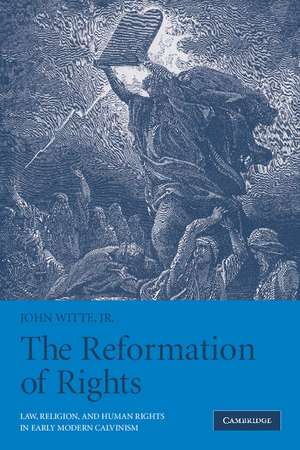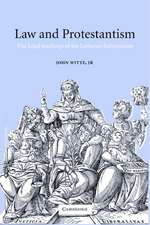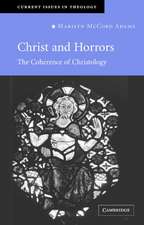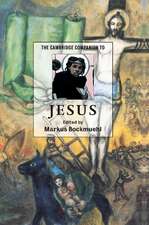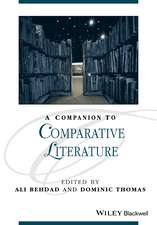The Reformation of Rights: Law, Religion and Human Rights in Early Modern Calvinism
Autor John Witte, Jren Limba Engleză Paperback – 2 ian 2008
| Toate formatele și edițiile | Preț | Express |
|---|---|---|
| Paperback (1) | 329.32 lei 6-8 săpt. | |
| Cambridge University Press – 2 ian 2008 | 329.32 lei 6-8 săpt. | |
| Hardback (1) | 457.16 lei 6-8 săpt. | |
| Cambridge University Press – 2 ian 2008 | 457.16 lei 6-8 săpt. |
Preț: 329.32 lei
Nou
Puncte Express: 494
Preț estimativ în valută:
63.01€ • 65.97$ • 52.14£
63.01€ • 65.97$ • 52.14£
Carte tipărită la comandă
Livrare economică 05-19 aprilie
Preluare comenzi: 021 569.72.76
Specificații
ISBN-13: 9780521521611
ISBN-10: 0521521610
Pagini: 406
Ilustrații: 7 b/w illus.
Dimensiuni: 150 x 226 x 23 mm
Greutate: 0.54 kg
Ediția:New.
Editura: Cambridge University Press
Colecția Cambridge University Press
Locul publicării:Cambridge, United Kingdom
ISBN-10: 0521521610
Pagini: 406
Ilustrații: 7 b/w illus.
Dimensiuni: 150 x 226 x 23 mm
Greutate: 0.54 kg
Ediția:New.
Editura: Cambridge University Press
Colecția Cambridge University Press
Locul publicării:Cambridge, United Kingdom
Cuprins
Introduction; 1. Moderate (religious) liberty in the theology of John Calvin: the original Genevan experiment; 2. The duties of conscience and the free exercise of Christian liberty: Theodore Beza and the rise of Calvinist rights and resistance theory; 3. Natural rights, popular sovereignty, and covenant politics: Johannes Althusius and the Dutch Revolt and republic; 4. Prophets, priests, and kings of liberty: John Milton and the rights and liberties of all Englishmen; 5. How to govern a city on a hill: covenant liberty in Puritan New England; 6. Concluding reflections: the biology and biography of liberty.
Recenzii
'Historians, not to mention philosophers and theologians, have too long overlooked the Calvinist contribution to the human rights tradition. John Witte's superlative study definitively corrects that shortcoming and thereby makes an indispensable contribution to our changing understanding of that tradition.' David Little, Harvard Divinity School
'John Witte has written a magistral survey of ideas about law, religion and human rights as developed by John Calvin in sixteenth-century Geneva and then developed and adapted by selected intellectual descendants of his in France, the Netherlands, England, and colonial America. These ideas are analyzed with all the clarity and bite one expects of a great historian of thought. They should make a useful and thought-provoking contribution to modern attempts to cope with concepts that are still of fundamental importance.' Robert M. Kingdon, University of Wisconsin, Madison
'The Reformation of Rights will come as a revelatory jolt to those who embrace the standard history of natural rights, which holds that the idea of such rights was introduced into Western thought by the political philosophers of the Enlightenment. Witte's argument, developed with meticulous attention to the sources, and always judicious in its conclusions, is that centuries before the Enlightenment, Calvinists were arguing for natural rights, especially natural religious rights: freedom of conscience, freedom of exercise, freedom of the church. The Reformation of Rights is a magisterial contribution to a new narrative of rights.' Nicholas Wolterstorff, Yale University
'Witte's [The] Reformation of Rights is … [a] cohesive and ambitious book. … Amid the growing number of recent books about the history of religious coexistence in early modern Europe, this one should not be overlooked.' Journal of Ecclesiastical History
'… essential reading for scholars and students of history, law, religion and politics, ethics and human rights, and the Reformation.' Journal of Reformed Theology
'John Witte has written a magistral survey of ideas about law, religion and human rights as developed by John Calvin in sixteenth-century Geneva and then developed and adapted by selected intellectual descendants of his in France, the Netherlands, England, and colonial America. These ideas are analyzed with all the clarity and bite one expects of a great historian of thought. They should make a useful and thought-provoking contribution to modern attempts to cope with concepts that are still of fundamental importance.' Robert M. Kingdon, University of Wisconsin, Madison
'The Reformation of Rights will come as a revelatory jolt to those who embrace the standard history of natural rights, which holds that the idea of such rights was introduced into Western thought by the political philosophers of the Enlightenment. Witte's argument, developed with meticulous attention to the sources, and always judicious in its conclusions, is that centuries before the Enlightenment, Calvinists were arguing for natural rights, especially natural religious rights: freedom of conscience, freedom of exercise, freedom of the church. The Reformation of Rights is a magisterial contribution to a new narrative of rights.' Nicholas Wolterstorff, Yale University
'Witte's [The] Reformation of Rights is … [a] cohesive and ambitious book. … Amid the growing number of recent books about the history of religious coexistence in early modern Europe, this one should not be overlooked.' Journal of Ecclesiastical History
'… essential reading for scholars and students of history, law, religion and politics, ethics and human rights, and the Reformation.' Journal of Reformed Theology
Descriere
Calvin's teachings spread rapidly throughout Western Europe shaping the law of early modern Protestant lands.
